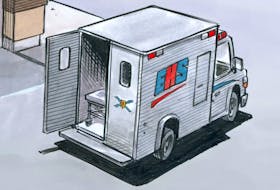It seemed like friendly banter. Prime Minister Pierre Trudeau walked up the steps of Parliament into the waiting microphone of reporter Tim Ralfe.
“Sir, what is it with all these men with guns around here?” Ralfe asked.
It was Oct. 13, 1970 and Canada was in the midst of the October Crisis. A group of home-grown terrorists had snatched two men off the streets – one would be murdered – in a bid to force Quebec independence. Trudeau ordered soldiers into the streets.
“What's your worry?” Trudeau said, smiling.
“I'm worried about living in a town that’s full of people with guns running around.”
“Why? Have they done anything to you? Have they pushed you around or anything?” Trudeau replied.
“They’ve pushed around friends of mine.”
“Yes? What were your friends doing?”
“Trying to take pictures of them.”
“A-ha,” laughed Trudeau, doing his best Sherlock Holmes imitation.
“Is that against the law?” Ralfe demanded.
“No, not at all.”
“Doesn’t it worry you, having a town that you’ve got to resort to this kind of thing?” Ralfe said.
“It doesn’t worry me. I think it’s natural that if people are being abducted that they be protected against such abductions.”
That exchange took about 38 seconds. Barely five minutes later, as the back-and-forth continued, perhaps the most famous phrase in a Canadian political interview would be uttered, provoked by Ralfe’s persistent questioning.
“I still go back to the choice that you have to make in the kind of society that you live in,” Ralfe said.
Trudeau’s impatience was obvious.
“There are a lot of bleeding hearts around who just don’t like to see people with helmets and guns. All I can say is, go on and bleed, but it is more important to keep law and order in the society than to be worried about weak-kneed people who don’t like the looks of ...”
Ralfe cut in.
“At any cost? How far would you go with that? How far would you extend that?”
“Well, just watch me,” said Trudeau, staring at Ralfe. The CBC reporter’s bosses would later say his questioning was disrespectful and scolded Ralfe for it.
Imagine if they had been watching CNN’s Jim Acosta press U.S. President Donald Trump this week over his claims of a looming Hispanic “invasion” threatening his country.
The ‘invaders’ are a stumbling collection of men, women and children fleeing violence in places like Honduras. They’re walking through Mexico, hoping to get asylum in the U.S.
“They are hundreds and hundreds of miles away. That is not an invasion,” said Acosta.
Trump attacked.
“I think you should let me run the country, you run CNN, and if you did it well, your ratings would be much better. That’s enough. That’s enough,” he said, demanding Acosta stop asking questions.
Acosta pressed. Trump was incensed.
“I’ll tell you what, CNN should be ashamed of itself, having you working for them. You are a rude, terrible person and should not be working for CNN,” Trump said.
He’s wrong. It is the job of reporters to hold the spenders of public money to account. President, prime minister, or premier, asking unpopular questions is what journalists – acting on behalf of the public that pays the bills – are supposed to do.
It’s not a popularity contest, but it is an honourable task.
Rick MacLean is an instructor in the journalism program at Holland College in Charlottetown.








